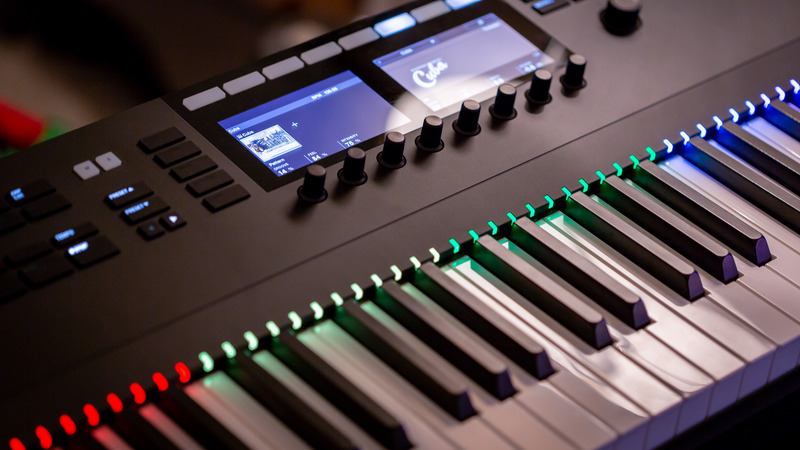Choosing the most appropriate piano for a beginner or piano student can be a daunting task.
However, it is important to get it right at the start of a musical journey because, often, it will determine if you wish to continue.
As a new starter, it can be difficult to understand the differences between pianos and keyboards, but they are distinct and will be suited to contrasting styles and abilities.
Here, we highlight the key characteristics of acoustic pianos, digital pianos and keyboards in an attempt to assist with your decision.
There are three basic categories of keyboard instrument available:
- Digital pianos– Larger and more expensive than electronic keyboards, but nearly as versatile while mimicking the feel of an acoustic piano well. A great alternative if budget and space allows.
- Acoustic pianos– The best option for playing experience and sound quality, but by far the largest and can be extremely expensive than digital pianos.
- Digital keyboards– The least expensive, most convenient, and most versatile instrument are the digital keyboards. The sound it produces aren’t as good as acoustic pianos, but keyboards work well as a first instrument for beginners.
Acoustic pianos
Despite being arguably the best choice in terms of playing experience and sound quality, an acoustic piano is the most expensive option for a beginner.
Many musicians would say an acoustic piano is the only one if you’re learning to play because it allows you to experience the full, rich sound produced by real strings and responsiveness that only real wood offers.

The typical price range for a quality acoustic upright (also called “vertical”) piano may range anywhere from £3,000 onwards. If you want to buy a grand or baby grand piano, expect to pay £6,000 to £10,000 or more.
Although the price of an acoustic model can be steep, choosing a cheaper version in inferior condition is never recommended because it risks hindering what should be a fun and creative learning process.
Listed below are some of the popular acoustic piano brands:
Kawai
Digital pianos

Digital pianos can be a great alternative to acoustics, particularly for beginners, as they are designed to mimic their sound and feel.
High quality digital piano models have sensitive, weighted keys that provide a glimpse of the range you would experience playing an acoustic.
They often arrive installed in a cabinet console to replicate an upright piano, something that is useful for new starters because it ensures they are playing at the correct height.
Digital pianos are a mid-range option, and often much better than settling for an old, out-of-tune acoustic.
Digital pianos will almost always have a USB MIDI connection, allowing you to connect a computer or portable device. This allows you to use apps and other programs to access more sounds, record, and access other functionality of piano-learning apps.
While it’s not possible to simulate the experience of playing on an acoustic piano, there is nothing wrong with starting out on a digital piano at beginner level.
Listed below are some of the popular digital piano brands:
Casio Hybrid
Kawai
Roland
Electronic Keyboards
Keyboards are the lowest cost option when it comes to playing the piano, and for good reason.
Priced at anywhere between £50 and £500, a keyboard is often seen as more of a novelty. If you’re not ready to spend several hundred to a few thousand dollars on a piano, a beginner can get started with an electronic keyboard.

Unlike an acoustic or digital piano, most beginner-level keyboards do not have 88 keys and, more importantly, do not have weighted keys.
Keyboards do not mimic the feel or sound of a piano and, instead, act as a synthesizer which is why they discourage beginners from learning to play. Consider buying electronic keywords from popular brands such as Yamaha, Korg, Roland, and Casio.
Acoustic vs. Digital Piano vs. Electronic Keyboards
There are certain advantages to having a digital piano or electronic keyboard over an acoustic piano, such as the ability to plug in headphones so that a beginner can practice without causing any disturbance to the rest of the family.
Unlike acoustic pianos, digital pianos and electronic keyboards never need to be tuned. If you have the space and budget, then go for an acoustic piano.
An acoustic piano is a great investment and adds so much value to your home, and makes a clear statement of commitment to making music a part of your family’s life.
If you’re on a budget, buying a used instrument may make more sense than investing in a new instrument.
A majority of the piano retailers, with the help of TakeItAway scheme, provide interest-free loans for musical instruments, equipment, software and tuition, offering support to musicians at every level.
Learning to play piano helps to build confidence and make lasting memories and friendships with others pursuing their lifelong passion for music.





